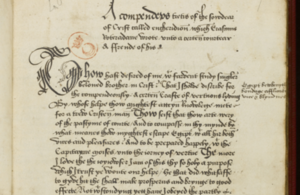At risk of export: A ‘lost’ Tyndale Translation? The earliest English version of Erasmus’s ‘Handbook of the Christian knight.’
Culture Minister Ed Vaizey has placed a temporary export bar on a newly discovered 16th Century manuscript, thought to be the earliest surviving English translation of any work by the great humanist scholar and reformer Desiderius Erasmus.

Erasmus manuscript
The manuscript will be exported overseas unless money can be found to match the asking price of £242,500.
Erasmus was one of the most important intellectual influences on the English Reformation, and this manuscript is the earliest contemporary English translation of his popular work the Enchiridion militis Christiani or ‘handbook of the Christian knight’, a compendium of humanistic piety which, with its emphasis on lay devotion, evoked widespread interest throughout Europe. The manuscript on paper, written in 1523 most likely by a professional scribe, comprises 145 leaves and may represent a ‘lost’ translation of the Enchiridion by the religious reformer William Tyndale. The volume has been in the Duke of Northumberland’s collection at Alnwick Castle since at least 1872, but its true significance only became clear when it was put up for sale.
The Minister has deferred granting an export licence for the piece following a recommendation by the Reviewing Committee on the Export of Works of Art and Objects of Cultural Interest, (RCEWA) administered by Arts Council England. The Committee made their recommendation on the grounds that it is of outstanding significance for the study of cultural movements towards the Reformation in England, the earliest known translation of Erasmus into English, and of significance for the study of scholastic links between Erasmus and Tyndale.
Culture Minister Ed Vaizey said:
This manuscript from the 16th Century is a rare and important work that is recognised for its impact in pre-Reformation England as well as being considered as a formative text for Henry VIII’s court. I sincerely hope that funds can be raised for a matching offer to keep the manuscript in the UK.
Christopher Wright from the RCEWA said:
This newly discovered translation of one of Erasmus’s most popular works would be of great interest in its own right. The tantalising possibility that it is the hitherto lost translation by William Tyndale confers on it international importance. Tyndale, whose English translation of the Bible came to form the basis of the Authorised Version, was executed by the Inquisition at Vilvoorde in Brabant in 1536. Earlier in his career, when he was a tutor in Gloucestershire to the children of Sir John Walsh, he is known to have completed an English translation of Erasmus’s ‘Handbook of the Christian knight’. This must have been finished by spring 1523 but was thought to have been lost. Its relationship to the text of the English translation, printed by Wynkyn de Worde in 1533 has long been a matter of scholarly debate. The date of this manuscript may help resolve the issue.
The decision on the export licence application for the manuscript will be deferred for a period ending at midnight on 13 April 2015. This period may be extended until 13 July 2015 if a serious intention to raise funds to purchase the piece is made at the recommended price of £242,500.
A picture of the manuscript can be found on our flickr site.
Background Information
-
Organisations or individuals interested in purchasing the works should contact RCEWA on 0845 300 6200.
-
Details of the work are as follows: An English translation of Erasmus’s Enchiridion militis Christiani Ink on paper, 1523 22.5 x 31 x 4.5 cm (leaves each 285 x 190mm)
-
The Reviewing Committee on the Export of Works of Art and Objects of Cultural Interest is an independent body, serviced by Arts Council England, which advises the Secretary of State for Culture, Media and Sport on whether a cultural object, intended for export, is of national importance under specified criteria.
-
Arts Council England champions, develops and invests in artistic and cultural experiences that enrich people’s lives. Between 2010 and 2015, it will invest £1.9 billion of public money from government and an estimated £1.1 billion from the National Lottery to help create these experiences for as many people as possible across the country. www.artscouncil.org.uk